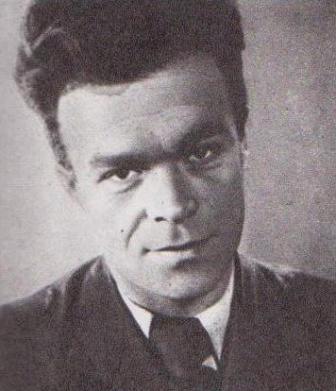The famous Soviet film director Mark Donskoy was born in Odessa in 1901 (or, according to other sources, in 1897). His father was a stove-maker. Mark took part in the civil war in Russia (1918-20) as a Red Army soldier. After his demobilization, Donskoy studied psychology, psychiatry, and law. However, in 1926 he began a career in film production. He produced his first film in 1929. In the 1930s he gained a reputation as a maker of films on ethnic minorities. At the beginning of 1941, Donskoy was awarded the Stalin Prize for his film trilogy about the writer Maksim Gorky.
When the Soviet-German war began, Donskoy, already a noted cinematographer with an exemption from military service, enlisted in the militia, and, for a while, even commanded a company. However, he was ordered to return to the rear, to the city of Ashkhabad (in Central Asia), to which his studio was evacuated. In Ashkhabad, he made several films dealing with the war, including "Rainbow" (1944, based on a novel by Wanda Wasilewska) and "The Unvanquished" (1945, based on a novel by Boris Gorbatov). These films increased Donskoy's reputation as an outstanding film director, but this was more so abroad than at home. "Rainbow" was shown, inter alia, in the USA. According to some accounts, "Rainbow" produced such a strong impression on viewers there that some Americans reacted by volunteering to fight in World War II. In 1944, the film received the highest award of the American Film Critics Association. Mark Donskoy's son Alexander recollected that, prior to its public screening, U.S. President Franklin D. Roosevelt sent Mark the following telegram: "On Sunday, we in the White House saw "Rainbow." I invited Ambassador Charles Bohlen to translate, but we understood the film even without translation. It will be shown to the American people in its rightful greatness. Yours, Franklin Delano Roosevelt." Remarkably, the Soviet authorities, who were very averse to their citizens having "foreign connections," forgave Donskoy for the telegram received from America – just as they forgave him for having many American relatives.
Donskoy's "The Unvanquished" appears to have been the first in world cinematography to deal with the Holocaust. The film focuses on the fate of a skilled Ukrainian worker Taras Iatsenko, who attempts to disobey the order of the German occupiers of his town to reconstruct a destroyed factory. The second main character in the film is the old Jewish doctor Aharon Fishman (played by Veniamin Zuskin, a famous actor of the Moscow-based GOSET Yiddish theater). During the entry of the Wehrmacht to the town, Dr. Fishman is sitting at the sick bed of Taras's granddaughter. He refused to leave town because he was not willing to abandon his patients. In the following scene, we see the whole spectrum of abuses and persecution that the Jews experienced in the Nazi-controlled areas: the introduction of a Jewish armband, the ghetto, etc. The plot line that deals with Dr. Fishman ends with the mass murder of the Jews in the town: the Jews are taken away by the Germans and then shot. At the very moment that the Jews are being taken to their death, Dr. Fishman notices Taras bowing down before the doctor and his fellow Jews. To the Doctor's question: "Is it to me that you are bowing?" Taras replies: "To you and to your suffering". Dr. Fishman responds: "Thank you, [for being a] human being" (Spasibo, chelovek).
After the war, Donskoy continued making films. For all of his profession life he was a Soviet loyalist. Many of his films dealt with Lenin, Gorky, and other Soviet historical figures. He was awarded numerous Soviet and foreign prizes. The famous Italian cinematographers Giuseppe de Santis and Federico Fellini regarded him as a precursor of neo-realism.
Donskoy died in Moscow in 1981.







